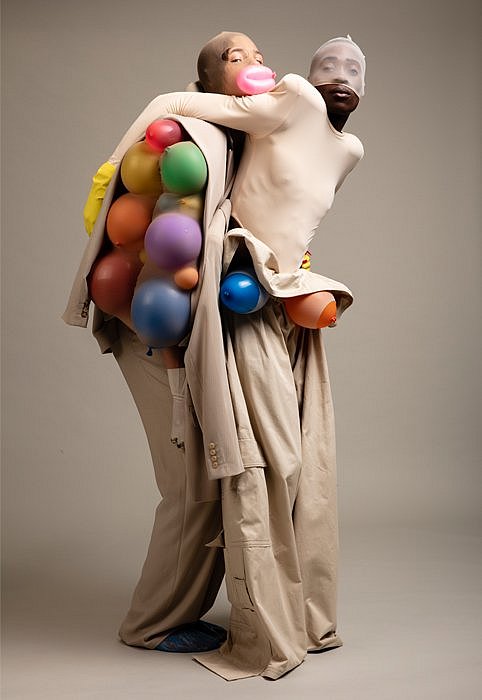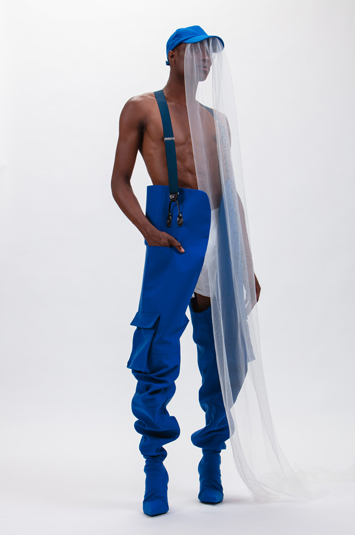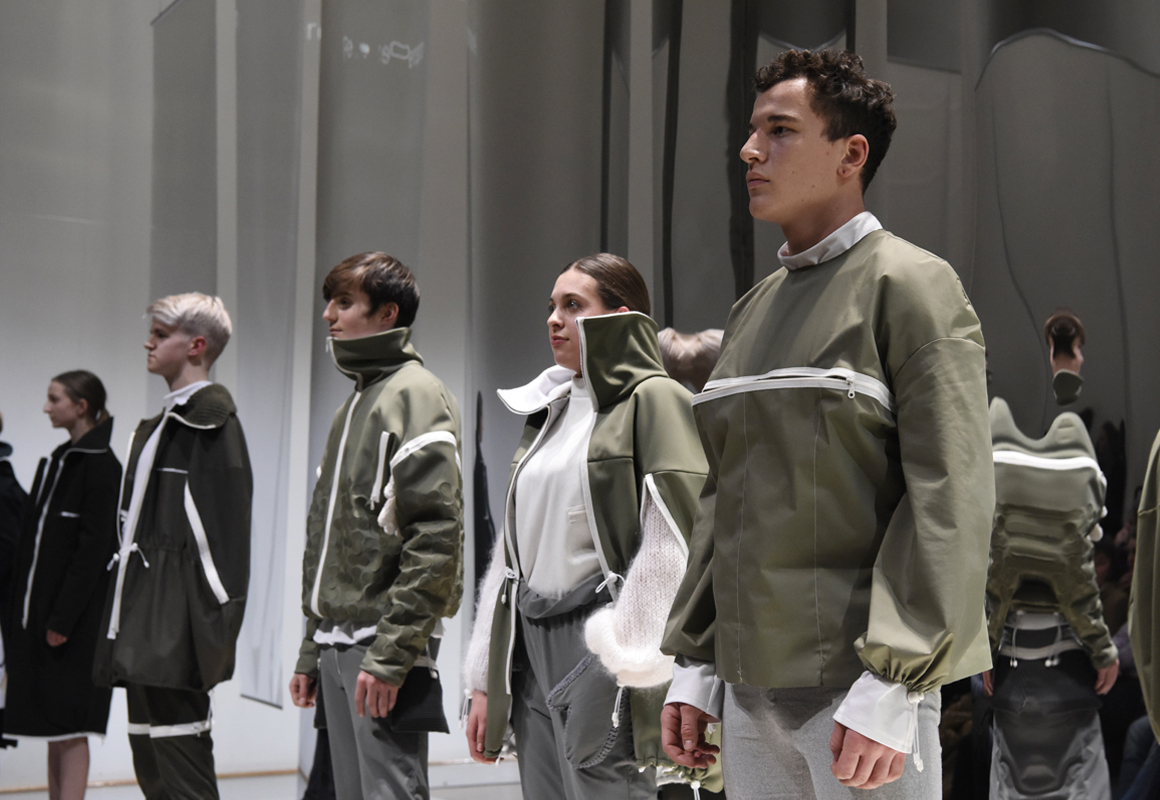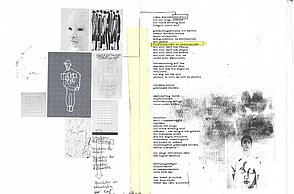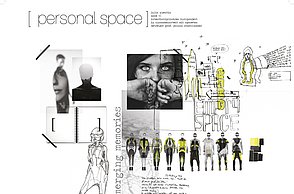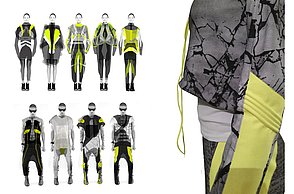What makes fashion studies in Pforzheim unique? The School of Design with its predecessor institutions has been in existence since 1877, the fashion program since 1949. We offer a specialized course of study with a long tradition, scientifically sound work and the diverse opportunities for interdisciplinary and artistic work open up access for students to the international fashion business. Studying in small classes enables intensive professorial supervision in a relaxed family atmosphere and creative environment. This is what distinguishes the Pforzheim fashion program and makes it so successful.
The highly diverse program content offers at its core a broad in-depth “phygital” experience of vestimentary disciplines including gender-related and fluid fashion, textiles, material and knitwear that combined, provide a transferable and holistically formed expertise. Extended research and investigational exploration of original ideas, will be contextualised and integrated into design strategies on different key levels: visually, materially, spatially, textually, environmentally and virtually.
The “phygital” interplay of traditional and contemporary techniques with emerging technologies is as vital to the education as new developments, practices and technological shifts. Arguably the vectors of fashion, cultural and digital movements, market shifts as well as clothing and garment production are fundamental to be reviewed and critically realigned during the creative stages. Inter- and trans-disciplinary ventures, collaborative projects, crossover activities allow totally integrated units of study to extend design and fashion challenges. Connecting to fine art, popular culture, critical studies and environmental issues creatively, fashion and its design process is pushed to its ‘perceived’ boundaries thus ensuring an innovative statement with distinctive quality and value to industry and markets. This will be delivered to management through remarkable social skills, versatility, and professionalized communication tools as well as through the capacity to connect at speed.
Designing fashion means recognizing different needs and demands, but also dreams. Fashion knows no national barriers. Fashion designers are the architects of the human shell. Their name is the signboard of many companies. We have tailored the teaching in the fashion program to these creative and professional requirements. It is a synthesis of art-design creativity, science and practice. The aim of the scientific subjects such as art analysis, aesthetics, semiotics, fashion history and fashion analysis is to intensify the possibilities of perception, i.e. to read signs, to recognize historical developments and to impart cultural knowledge. The semesters focus on topics such as social and cultural influences on fashion or interactions, aesthetics, composition and color theory, which are incorporated into project concepts and their practical implementation.
„Our strength is comprehensive education. We encourage our students to develop their very own talents. Small courses, individual specializations paired with a broad-based basic education and a close-knit network to international fashion companies prepare our graduates optimally for a successful start into their professional lives.“
Prof. Johann Stockhammer
We promote interdisciplinary work between our six BA Design courses and within the entire university; an important experience for our students to be able to work successfully in teams as designers later on. Joint projects and cooperations with universities worldwide are part of the education.
During excursions, students learn about design, art, culture, craft techniques, industrial market conditions and consumer behavior in other countries, thus raising awareness of a clear global design attitude. This facilitates and enables graduates to enter international professional life or to be accepted into renowned international master's programs.
Course of studies
The basis of the program is an artistic, technical and theoretical training, on which individual projects are developed visionary and deepened. Topics from various areas of fashion are analyzed and concepts for collections, stage costume and accessories are developed. Within the wide range of classes, the first semesters focus on experimenting with shapes, colors, materials and cuts.
Small and large excursions, guest lectures and workshops are regularly organized, and stays abroad are encouraged for study and practice. Our students successfully participate in national and international competitions, fashion shows and exhibitions and present their final projects in a public fashion show, which is organized in all details on their own responsibility and takes place at the end of the semester within the framework of the work show of the School of Design. After graduation, the alumni benefit from numerous industry contacts that have been cultivated in our program for years.
Cooperation partners
Cooperation partners in past semesters have included:
- Landesmuseum Stuttgart
- Kunstmuseum Stuttgart
- Diözesan Museum Rottenburg
- Kunsthalle Karlsruhe
- Badische Philharmonie
- Ethical Fashion Label "3FREUNDE"
- Hohenstein Institute
- Lenzing AG (Österreich)
- Haus der Geschichte BW Stuttgart
- Galerie Stihl Waiblingen
- ’zoeppritz since 1828’
- Institut für Textil- und Verfahrenstechnik Denkendorf
We want curious applicants with the need for exchange and the will to develop further. Openness for new ways, perseverance, assertiveness and joy in design are important to us. We are convinced by portfolios that show not only technical drawing skills, but also an interest in fashion and a willingness to find unconventional solutions.
We are a state university in Baden-Württemberg; EU citizens pay no tuition fees, only a small administrative fee and the student union fee. You will receive support for material costs incurred for project work: materials can be obtained cheaply through our workshops, we organize material donations from companies and visits to fabric suppliers.
There are numerous offers to finance your own studies. We regularly provide information in lectures about possible funding programs and scholarships such as the Deutschlandstipendium.
Student life in Pforzheim is comparatively inexpensive: housing costs are low and the StudiTicket for public transportation is free.
Yes, the Fashion program offers applicants who have received a letter of admission to complete the pre-study internship as a paid course at the university before they begin their studies. This means that after passing the entrance exam in June, the course will take place in September, and after passing the entrance exam in December, the course will take place in late February to early March. This three-week course in our workshops replaces the three-month preliminary internship. Our applicants will receive further information about the preliminary course during the entrance examination or from the scientific staff.

